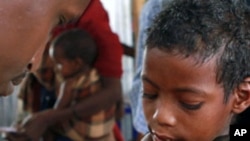United Nations aid agencies report measles is continuing to spread at an alarming rate throughout drought-stricken Horn of Africa. Aid agencies are conducting vaccination campaigns in drought-affected countries to immunize millions of children against this killer disease and to try to contain its spread.
More than 12 million people in Ethiopia, Kenya, Djibouti and Somalia are affected by the worst drought to hit the Horn of Africa in 60 years. Somalia, which is struggling with both drought and famine, is the most seriously affected. Somalia is also bearing the brunt of the measles epidemic, which is sweeping through the Horn of Africa.
In July alone, the World Health Organization reports more than 1,000 suspected measles cases and 31 related deaths occurred in South and Central Somalia. Since January, WHO says nearly 5,200 suspected measles cases were reported.
WHO spokesman Tarik Jasarevic says the number of cases this year is several times higher than during the same period over the last two years.
"The major factors for a measles outbreak in Somalia are low coverage, malnutrition, population movements, and overcrowded internally displaced camps," he said. "WHO fears that the measles outbreak could affect a high number of people, especially among the vulnerable IDPs [Internally Displaced Persons] whose overall health is already fragile. Measles can be prevented by vaccination. The routine immunization coverage against measles in Somalia is only 29 percent."
As a response to the measles outbreak, WHO, the U.N. Children’s Fund and partners have started an emergency vaccination campaign in all accessible areas of South and Central Somalia, which is under the control of the Islamist al-Shabab militants.
UNICEF spokeswoman Marixie Mercado says lack of access is a great cause of concern because it prevents aid agencies from reaching all children with the life-saving vaccines.
"Some of the new measles cases are from districts called Hiran and Lower Shibelle," she said. "In these areas, the measles coverage has been historically low, even below what is already a low national coverage because access has been so difficult. What I heard from my colleague in the field today was that we were denied access as recently as two days ago to these areas, but we keep trying. And, that is essentially how we are doing it. We are immunizing as we can."
Mercado says UNICEF has dispatched 700,000 doses of measles vaccines to Mogadishu, for the campaign starting Friday. She says hundreds of thousands of children already have been immunized in IDP areas of Mogadishu and in Gedo. She says the overall target is to immunize 2.5 million children between six months and 15 years old.
Elsewhere, Mercado notes mass measles campaigns are under way in refugee camps in Ethiopia and Kenya.
VOA correspondents Peter Heinlein and Gabe Joselow reported this past week from Mogadishu, Somalia, about the humanitarian situation there. Watch some of their pictures:




